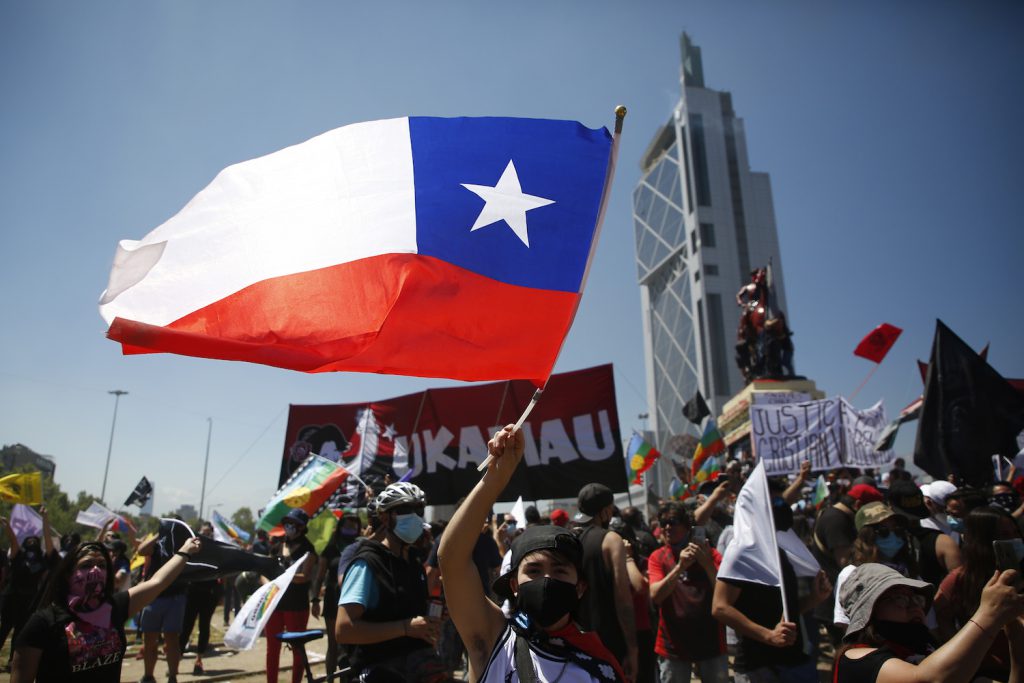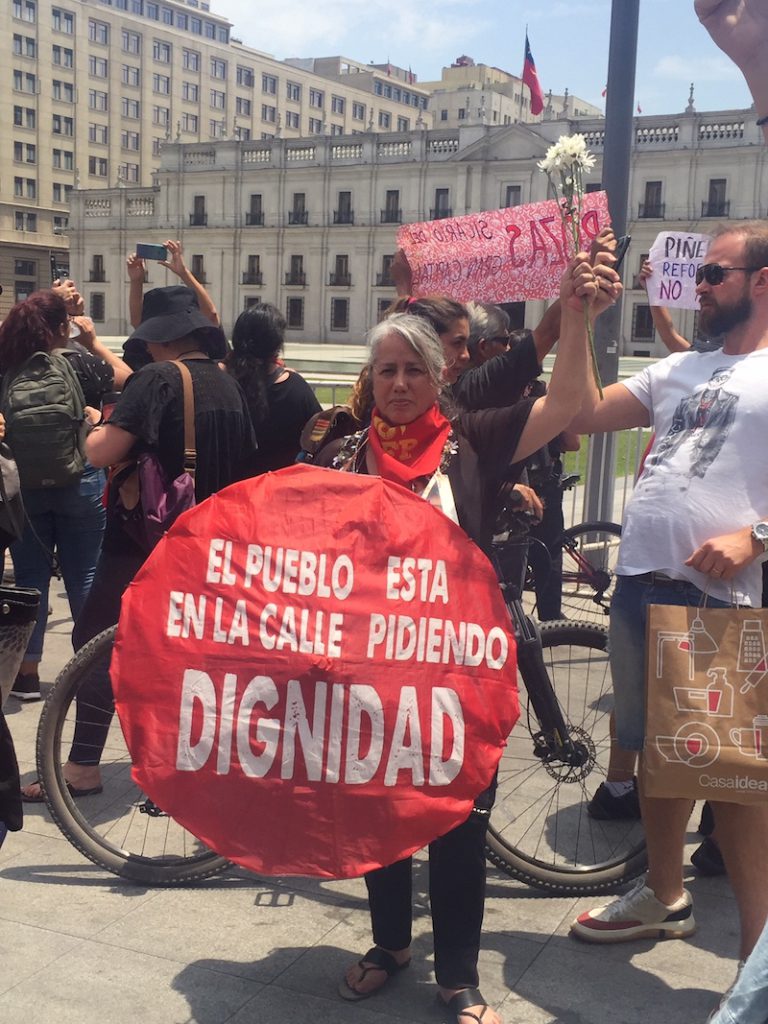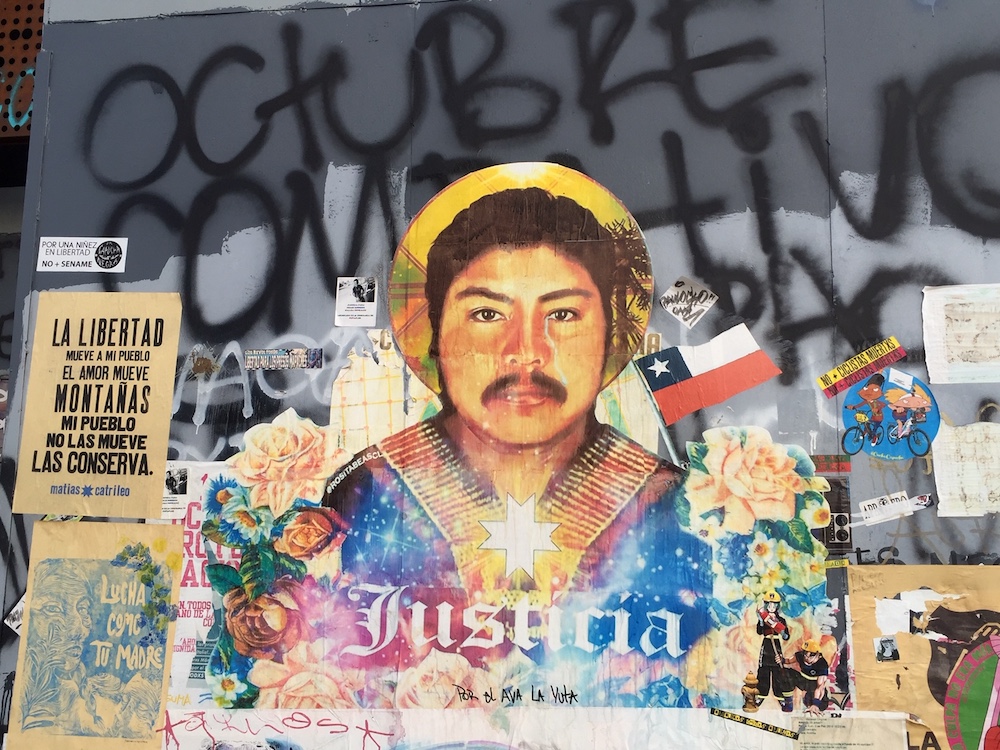A Radical Recentering of Dignity

In an interview during October of 2019, Chilean President Sebastián Piñera made a statement that would soon come back to haunt him. “Look at Latin America,” he said. “Argentina and Paraguay are in recession, Mexico and Brazil in stagnation, Peru and Ecuador in deep political crisis, and in this context, Chile looks like an oasis because we have [a] stable democracy.”
A day later, Chile was in flames.
What began as a group of students jumping turnstiles in response to a 30 peso increase in metro fares soon became a nationwide protest against economic inequality.
“No one saw this coming,” was the phrase repeated by political elites. They, like Piñera, clung to the idea of Chilean exceptionalism, or the country’s reputation for political and economic stability. They failed to see the growing discontent regarding the high cost of health care, low pensions, and a perceived lack of empathy on the part of politicians.
However, many Chileans did see it coming. Indignant, they quoted statements by government officials that demonstrated how out of touch they were with the struggles of people in the lower and middle classes. In July of 2019, an undersecretary of the health department argued that long lines formed outside of public health centers in the morning because people liked to socialize. In actuality, people lined up to get an appointment that day. And in October, when commenting on the increase in metro fares, the economics minister suggested that if people got up earlier, they could pay off-peak fares. Many Chileans who take long bus rides just to get to the metro found this comment particularly insulting.
On October 25, over a million people marched in Santiago demanding social reform. “It’s not 30 pesos, it’s 30 years,” they shouted, alluding to the 30th anniversary of the country’s transition from dictatorship to democracy.
I watched the protests as an anthropologist who has spent the last few years interviewing Chileans on their memories of the 1988 plebiscite. In that historic referendum, the country had the option of voting either YES to eight more years of dictator Augusto Pinochet or NO in order to return to democratic elections. At that time, the pro-democracy movement had decided that they could not simply ask the public to vote against Pinochet. They needed to ask Chileans to vote for something. The slogan of the NO campaign, which won 56 percent of the population, was: “Joy is on its way.”
The graffiti that covered the walls of Santiago during the 2019–2020 protests echoed the 30-year-old promises of the democracy campaign: Joy did not arrive so we went to find it. You owe us a life. A dignified life.
Like the protests in Central and Eastern Europe in 1989, Spain and the Middle East in 2011, Ukraine in 2014, and Hong Kong since 2014, “dignity” became the battle cry in Chile in the months that followed. Protest chants used in the 1980s to demand freedom were adapted to demand dignity, and the central plaza of the city was renamed by protesters the Plaza de la Dignidad.
As I watched the protests evolve, I wondered why dignity was the word of choice. What exactly were protesters demanding? And could they achieve it?
Chile’s current constitution was written under the Pinochet dictatorship and approved in 1980 in a plebiscite devoid of democratic guarantees. As political scientist Claudia Heiss has noted, social goods such as health and education are framed in the constitution primarily as “freedoms.” This has led to a system that not only encourages but guarantees a private market for basic services.
Throughout the 1980s, Chile went through a period of neoliberal reforms that intensified structural inequalities. One reform, for instance, approved a pension system that was based on individual capital accounts managed by private companies. To incentivize workers to switch to this system, contribution rates were set at a minimum to increase net take-home pay. As the first generation using this system retires, approximately 80 percent are receiving a pension that amounts to less than minimum wage.
Even after the return to democratic rule in 1990, making meaningful reforms to the current constitution has proven to be politically and legally difficult. And with a majority of Chileans struggling to cover everyday expenses, many feel they aren’t living the joyful, dignified lives that were promised 30 years ago.
As the protests against economic inequality continued over the past year, more and more Chileans argued that the creation of a new constitution would be the path to dignity.
The Chilean writer and journalist Patricio Fernández, who chronicled the protests in his book Sobre la marcha, told me how the word dignity came to mean: “Look at me, here I am. I’m not transparent.” It was a word that he linked to the struggles of the Mapuche.
The Mapuche are the largest Indigenous group in Chile. Notably, protesters have carried the Mapuche flag—and not those of political parties—in the demonstrations that continued throughout much of 2020 in various regions of Chile. For Ramona Reyes Painequeo, the country’s only female Mapuche mayor, the use of the flag is a source of pride. Reflecting on the violent police response to protesters, she told me, “Now the rest of the country is experiencing a little of what the Mapuche have always lived.”
Marcelo Catrillanca, the father of Camilo Catrillanca, a Mapuche man who was killed by police in 2018 and whose face has appeared in protest signs and graffiti across the city, considers the use of Mapuche symbols an act of empathy and recognition. “People see now that our fight has always been for dignity,” he told me in February of 2020.
For anthropologist Michael Jackson, a professor at Harvard Divinity School, using a word like dignity is a way of getting at what he calls the “existential imperative,” or the human need “to strive for an acceptable balance between being actors and being acted on, speaking and being spoken to, having and not having, giving and getting, and accepting things as they are even as we strive to improve our lot.” Though dignity in many ways defies definition, it involves an ongoing process of mutual recognition between people.
A song widely used in the protests, “El baile de los que sobran” (“The Dance of Those Left Behind”), speaks to this question of what it means to be in community with others. (Written in 1986 by Los Prisioneros, the song also appeared in the 1988 NO campaign.) In the above video from the protests, the crowd of voices grows louder as people sing these lines: “They asked for effort/ they asked for dedication/ and for what?/ To end up kicking at rocks!/ Join the dance of those left behind.”
When I have asked Chileans what has changed the most for them since the start of the October 2019 protests, they say that it is their relationship with their neighbors. “We had stopped looking at one another,” several people told me, “but now we have found our way back to each other.”
After weeks of protest, the government agreed to hold a plebiscite to ask Chileans whether or not to write a new constitution. On October 25, 2020, a total of 78 percent of the population voted in favor.
Chileans also overwhelmingly voted for a constitutional convention made up entirely of newly elected representatives, rather than including members of Congress.
On April 11, elections will take place to choose the members of this constitutional convention. In response to effective political mobilization across party lines, the government has announced that gender parity will be ensured in the process of crafting the constitution. As U.N.D.P. Resident Representative Claudia Mojica wrote, Chile will be “the first country in the world with a constitution drafted by an equal number of women and men.” No discussion has occurred, however, regarding nonbinary candidates.
Of the 155 members of the convention, 17 seats are reserved for Indigenous people. Given that the Indigenous population was not even recognized in the 1980 constitution, this marks a significant achievement. However, this number still falls short of the 24 seats that Indigenous leaders originally sought. In addition, the discussions surrounding representation showed that many politicians still fail to understand basic concepts related to dignity, such as the right to self-identify.
Will these changes be enough? As Jackson reminds us, it is impossible to measure existential goods such as dignity. There is no mathematical formula to ensure that Chile’s constitutional process produces the dignified life that people are demanding. But what is perhaps most exceptional about this process is the extent to which Chileans have agreed upon its necessity. Remarkably, the consensus around the need for change is greater now than it was during the 1988 plebiscite.
Chile may be showing a movement toward dignity through what I would call a radical recentering. By this I do not mean a gradual move toward the center through the collapse of the right/left divide, but rather a re-imagining of adversarial politics.
By agreeing that it’s time for a new constitution written under democracy, Chile may prove that there can be politics after polarization—a lesson that many other countries, including the U.S., could learn from. Through a movement to recenter political discussions around core values of empathy, freedom, and dignity, Chile may begin to respond to the indignation of those who have felt left behind for so long.

































